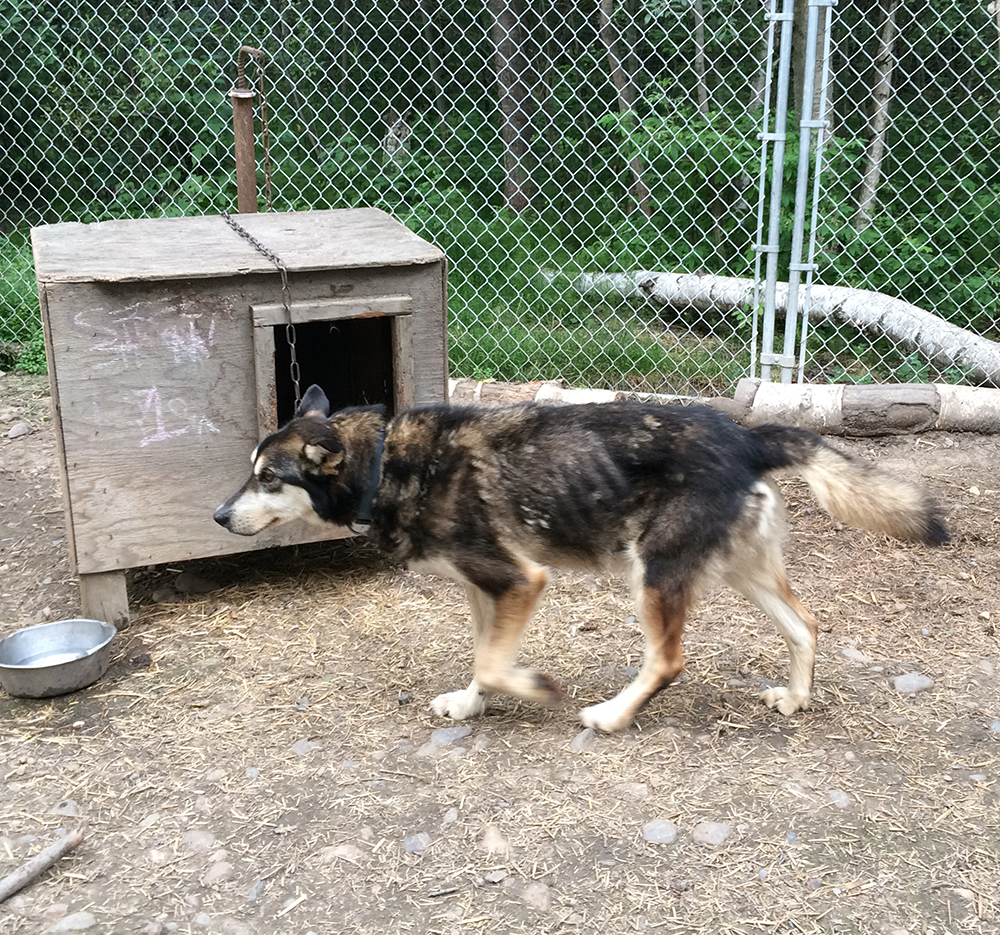Around two weeks ago it was time for Goblin’s abdomen to be drained. Due to his heart disease, he builds up fluid in his abdomen and we’ve been getting him drained around every six weeks.
We brought him to our new (and only) vet in Bancroft who did not want to do the abdominocentesis. Instead he suggested we give Goblin high doses of furosemide (Lasix)– 1.5 40mg tablets every two hours for the first day and then 1.5 40mg tablets every 4 hours for the second day.
We tried this for the first day, and there was no effect. Goblin’s abdomen was very full and he looked like he was in distress, and he was not peeing. We called the vet and told him nothing was happening and we would like him to be drained.
We dropped Goblin off, expecting him to be drained early in the day, and the vet called us in the afternoon saying Gob’s protein levels were very low (4) and that he didn’t want to drain him. He said draining the dog at such low protein levels would essentially be killing the dog.
We called our vet in Alaska and explained the situation and he confirmed what we thought, which is drain the dog– what other choice is there?
We called the Bancroft vet and told him to drain Goblin. We said we’re aware that his protein levels are low and that it may kill him, but do it!
Because it was late in the day, they drained 6 liters and told us to come back the next day to drain more. The next day they drained 5. A total of 11 liters (24lbs) was drained.
The vet told us to put Gobs on a high protein diet (chicken, eggs, cottage cheese) and that we needed to see a cardiologist. We agreed to this.
We had around a weeks time before going to the cardiologist in Toronto, so we were feeding Goblin boiled chicken and salmon. He didn’t like soft boiled eggs and I couldn’t find cottage cheese in the store. Note, we’re vegan, so boiling and feeding him chicken was a labor of love.
Also, we ran out of Torsemide (a diuretic). They don’t have this drug in Canada, so we had to put him back on Lasix. The vet recommended injectable Lasix. Goblin did NOT like the injections in his thigh and we had a really difficult time giving him the injections.
On Aug. 20, 2015 we drove 6 hours (three hours one way) to see a cardiologist in Toronto. Before seeing the doc, I was skeptical about the visit. But I’m glad we went. The doc was very knowledgeable and I trusted her.
First we chatted with an intern about Goblin. Then we saw the cardiologist, who asked the same questions (and some more) that the intern did. She was getting a full history on Goblin.
We agreed to do an ultrasound of his heart and and ECG. We also thought it would be a good idea (Greg’s idea) to do blood work to see if his protein levels increased due to his new diet.
After the ultrasound, the doc diagnosed Goblin with mitral valve disease and not dilated cardiomyopathy. She also said he was having premature premature ventricular contractions (PVC) and his heart rate was still a little fast.
Due to the fast heart rate, she added a drug to his regimine, Solatol (10mg tab every 12 hours).
She also suggested we try giving him the diuretic Hydrochlorathizide. However, the problem with Hydrochlorathizide is that there’s a 50% chance he’d go into kidney failure.
The blood work wasn’t back yet, so we left the docs office and headed home.
When we got home, there was a message waiting about the bloodwork. Goblin’s kidneys were already being affected, so hold off on the Hydrochlorathizide and use it only as a last effort. Also, stop the high protein diet! No more chicky and salmon (Goblin is sad about this).
In regard to mitral valve disease– it’s genetic. We have two of Goblin’s littermates (Myra and Lasher), and we think Goblin’s dad, Foxtail, died of a heart attack. Foxtail came from the TB kennel, as did Asa and Higgs. Asa and Higgs had heart problems. Higgs had sudden death and Asa died during surgery.
Nobody knows how much longer the Gobs has. We’re all amazed his lived this long since initial diagnosis in June 2014.
His current med list is:
- diltiazem: 30mg tabs – 1 tab every 8 hours
- enalapril: 10mg tabs – 1 tab every 12 hours
- furosemide: 40mg tabs – 1.25 tabs every 12 hours
- spironolcatone: 25mg tabs – 2 tabs every 12 hours
- sotalol: 10mg tabs – 1 tab every 12 hours
- vetmedin (pimobendan): -2.5 mg tabs – 3 tabs every 8 hours

